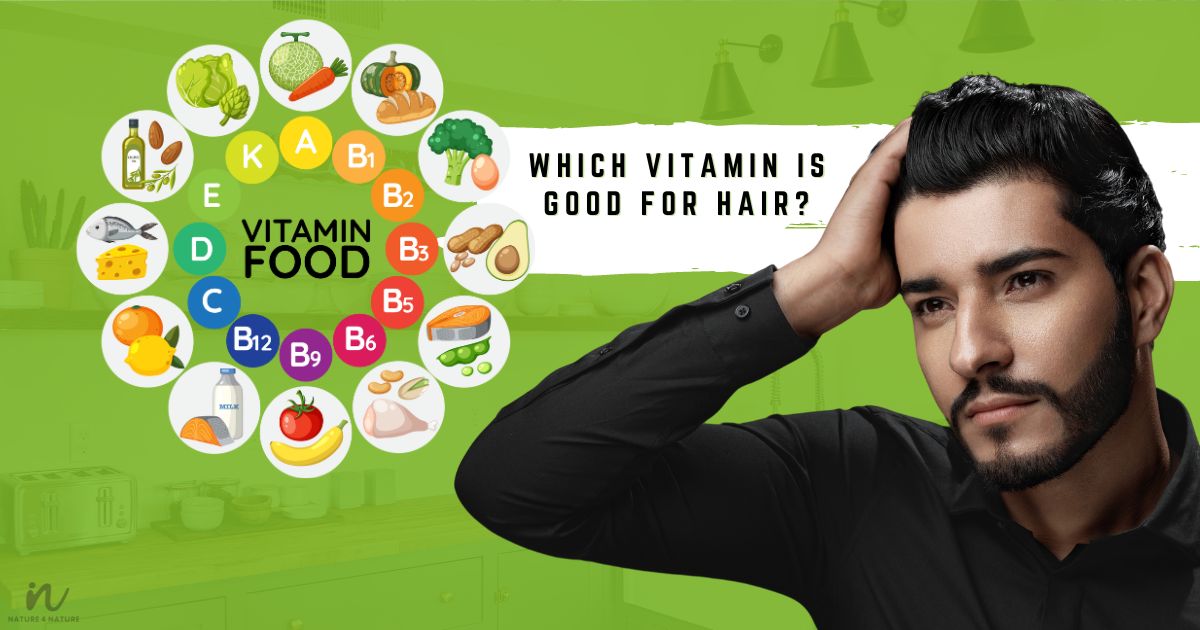Healthy, strong, and shiny hair doesn’t just depend on external care—your diet and internal health play a major role. Factors like genetics, hormonal changes, pollution, and stress can weaken hair roots and lead to hair fall. But one often overlooked cause of weak or thinning hair is vitamin deficiency.
So, if you’re wondering which vitamin is good for your hair, this detailed guide will walk you through the most essential nutrients for hair health. By the end, you'll know which vitamins to include in your daily routine for stronger, shinier, and thicker hair.
The Role of Vitamins in Hair Growth
Your hair grows through a continuous multi-phase cycle that depends on healthy follicles and a nutrient-rich scalp. Vitamins provide the nourishment your hair roots need to support this process.
Incorporating the best vitamins for hair growth helps:
-
Stimulate new follicle activity
-
Boost blood circulation to the scalp
-
Strengthen hair strands from the root
-
Improve shine, thickness, and resilience
Let’s explore the most important vitamins and minerals that promote hair growth.
Which Vitamin Is Good for Your Hair?
1. Vitamin A – The Scalp Nourisher
Benefits:
-
Helps produce sebum (natural oil) to moisturize the scalp
-
Prevents dryness and breakage
-
Promotes cell regeneration and tissue growth
Sources: Carrots, spinach, sweet potatoes, broccoli, pumpkin
2. Vitamin C – The Collagen Booster
Benefits:
-
Powerful antioxidant that protects against oxidative stress
-
Aids in collagen production for stronger hair shafts
-
Enhances iron absorption (another key nutrient for hair)
Sources: Citrus fruits, kiwi, strawberries, bell peppers, leafy greens
3. Vitamin E – The Circulation Enhancer
Benefits:
-
Protects hair cells from damage caused by free radicals
-
Improves blood flow in the scalp for healthier roots
-
Adds shine and softness
Sources: Almonds, sunflower seeds, avocados, olive oil, peanuts
4. Biotin (Vitamin B7) – The Keratin Builder
Benefits:
-
Supports keratin production (main protein in hair)
-
Prevents breakage and hair thinning
-
Essential for strong, thick hair strands
Sources: Eggs, almonds, fish, sweet potatoes, avocados
5. Vitamin D – The Growth Cycle Regulator
Benefits:
-
Plays a role in creating new hair follicles
-
Its deficiency is linked to hair loss conditions like alopecia
-
Helps maintain scalp health
Sources: Sunlight, salmon, mushrooms, fortified milk, eggs
Important Minerals for Hair Health
Iron – Oxygen Supplier
Role: Carries oxygen to hair follicles; without enough iron, hair becomes weak and falls out.
Sources: Red meat, lentils, tofu, spinach, beans
Zinc – Repair and Growth Agent
Role: Repairs damaged hair tissues and maintains oil glands around hair follicles.
Sources: Pumpkin seeds, chickpeas, lamb, eggs, cashews
Lifestyle Habits That Influence Hair Growth
In addition to vitamins and minerals, your daily habits also impact the health of your hair. Here's how to align your lifestyle for optimal hair growth:
Balanced Diet
Fuel your body with whole foods rich in nutrients like protein, fiber, and antioxidants. Avoid crash diets or skipping meals.
Stress Management
Chronic stress can disrupt your hair growth cycle. Practice yoga, deep breathing, or meditation daily to lower cortisol levels.
Adequate Sleep
Your body regenerates cells while you sleep—including those in the scalp. Aim for 7–8 hours of sleep every night.
Stay Hydrated
Dehydration leads to brittle, dry strands. Drink at least 8–10 glasses of water daily to keep your scalp nourished and hair strong.
Avoid Smoking
Smoking restricts oxygen flow to hair follicles, damaging them over time. Quitting can improve hair density and shine.
Healthy Hair Practices
Avoid excessive heat styling and tight hairstyles. Use natural products free from parabens and sulfates, and always oil your scalp weekly.
How to Know If You Have Vitamin Deficiency for Hair?
Signs you may be lacking key vitamins include:
-
Sudden hair thinning or excessive shedding
-
Dry, brittle strands and split ends
-
Slow hair growth
-
Dandruff or scalp irritation
-
Weak nails (a sign of biotin deficiency)
If symptoms persist, consider getting a blood test to identify deficiencies and consult a dermatologist or trichologist.
Conclusion
In the journey toward stronger, shinier, and healthier hair, vitamins are your silent heroes. Now that you know which vitamin is good for your hair, the next step is simple: include them in your diet or supplement routine consistently.
-
Eat a rainbow of fruits and vegetables
-
Supplement if necessary (consult a professional first)
-
Pair nutrition with smart lifestyle changes
Beautiful hair doesn’t just come from great products — it starts from within. Begin your hair health journey with the power of vitamins and feel the transformation naturally.


